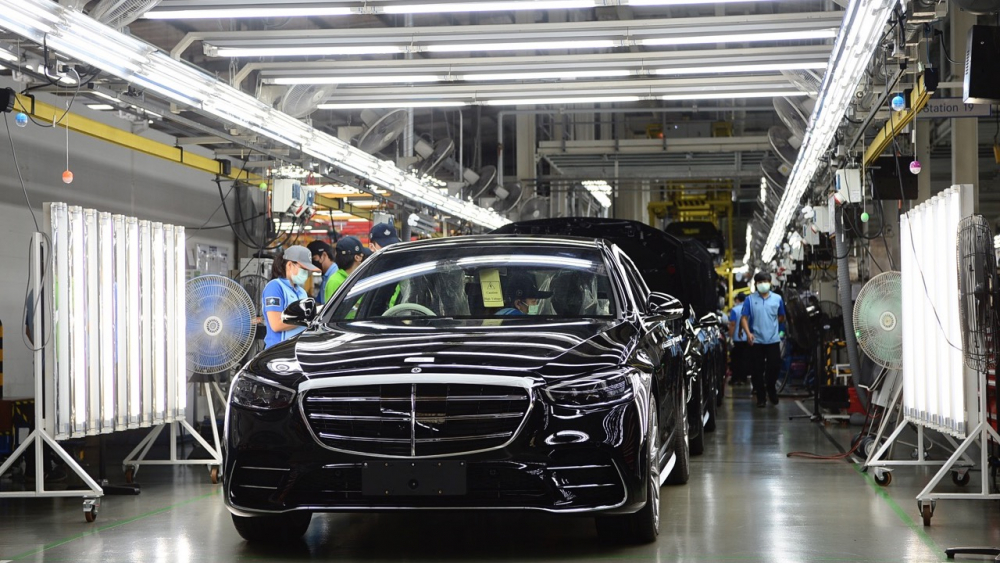 |
A Mercedes-Benz sedan rolls off the line at the company’s Thonburi Automotive Assembly Plant in Samut Prakan, near Bangkok, Thailand, which by the end of 2022 will be manufacturing fully electric Mercedes-EQS models — another milestone for EV production in Southeast Asia’s auto hub.
By the end of 2022, a fully-electric Mercedes-EQS will roll off a production line in Bang-kok to mark another milestone in Thailand’s remarkable journey from conventional au-tomaking hub to regional frontrunner in electric vehicle (EV) production, according to an article published by the country’s Board of Investment (BOI).
The German luxury carmaker not only chose Thailand as its first location in Southeast Asia to manufacture the trail-blazing EQS, but also selected the Kingdom as one of on-ly seven locations in the world to produce the high-performance lithium-ion batteries that can power the vehicle for more than 700 kilometers on a single charge, the article said.
“This shows how important Thailand is to us,” the article quoted Roland Folger, Presi-dent & CEO of Mercedes-Benz’s Thai business, as saying in an interview. “The EQS is the absolute highlight of our full battery vehicles -- the topmost as far as technology is concerned. In Thailand, we have partners we know can deliver.”
The emergence of Thailand, the world’s 10th biggest auto manufacturer in 2021, as an EV hub has been fast-tracked by highly favorable government policies that comprehen-sively incentivize both investors in the EV sector’s supply chain and car buyers, the ar-ticle said. The BOI offers 3-11 years of tax holidays for EV production of all types, in-cluding BEV platforms. The BOI also grants investment incentives for EV-related infra-structure, especially charging stations, to accelerate the growth of the domestic market for EVs.
Investors appear to be taking note. During the first quarter of 2022, investment pledges in the automotive and parts sector more than quadrupled from a year earlier to the equivalent of $1.2 billion, BOI data shows.
Auto giants including Toyota Motor Corp of Japan, as well as Great Wall Motor and SAIC Motor of China have also signed up for a government incentive plan to promote EV sales and production in Thailand, under which the government is offering subsidies of between $2,000 and $4,400 per vehicle depending on the model and battery capaci-ty.
Thailand, Southeast Asia’s second largest economy with a population of 70 million, is also attracting heavyweight newcomers determined to cash in on the EV revolution. Foxconn Technology Group, the world’s biggest contract electronics company that’s best known as a maker of Apple iPhones, has chosen Thailand as one of its first two locations in the world to build EVs.
Foxconn has partnered with Thailand’s state-owned oil and gas giant, PTT – one of the world’s largest energy companies -- to form a joint venture enterprise, HORIZON PLUS, that plans to invest between $1 and $2 billion to build finished cars for other manufac-turers using a modular platform and software developed by Foxconn. With production due to start in 2024, the partners plan by 2030 to be manufacturing between 150,000 and 200,000 vehicles annually in Thailand’s high-tech Eastern Economic
Home-grown Thai entrepreneurs are already building electric vehicles and developing the infrastructure to power them. Energy Absolute, a listed Thai company with a market value of $10 billion, is selling electric buses and boats, has an electric car ready to launch and is building what to date is the country’s biggest network of charging stations.
Other local companies, including startup MuvMi and long-established water transporta-tion operator Chao Phraya Express Boat Co., are replacing the country’s iconic but previously heavily polluting “tuk-tuk” auto rickshaws and diesel-powered fast river boats with emission-free electric versions.
Such is the rate of change that the Thai government estimates that by 2030 – just eight years from now -- 30 percent of all autos manufactured in Thailand will be electric. That would mean 750,000 out of the 2.5 million it is expected to produce for local and inter-national markets that year. Of that 750,000, half will be BEVs, the article said.
Thailand is setting equally aggressive targets for the infrastructure required to support its zero-emission ambitions. The government estimates that some 900 public quick chargers have already sprung up throughout the country.
That figure is forecast to rise to 4,400 public quick chargers by 2025, 12,000 by 2030 and 36,500 by 2035.
Today PTT, a Fortune 500 company majority owned by Thailand’s Finance Ministry and once synonymous only with oil and gas, is not only developing clean energy cars with Foxconn, but also making major investments in battery research and develop-ment, EV charging stations and an EV car rental platform. “We think that every step we move is more benefit to the world and to Thai society,” the article quoted Dr Buranin Rattanasombat, PTT’s Senior Executive Vice President for Innovation and New Ven-tures, as saying. “Our cooperation with Foxconn will be an important driving force in the development of the EV value chain in Thailand.”
Elliot Zhang, President of Great Wall Motors’ (GWM) business in ASEAN, says the re-gion is one of the most important markets in the world for China’s largest manufacturer of SUVs. Hence Great Wall’s decision in 2020 to acquire an auto production plant in Thailand formerly owned by General Motors.
“Thailand has superior geographical advantages, complete industrial supply chain and sufficient reserve of talented personnel,” the article quoted Zhang as saying. The locally produced Haval H6 hybrid SUV and ORA Good Cat BEV model, initially imported from China, successfully debuted in Thailand last year. “We are confident that all these strengths will enable our strategy to build Thailand as the R&D and manufacturing hub of GWM in the ASEAN region.”
To read the full article on the BOI website,
please follow this link
-
 PR55_2565.pdf
(Download)
PR55_2565.pdf
(Download)
